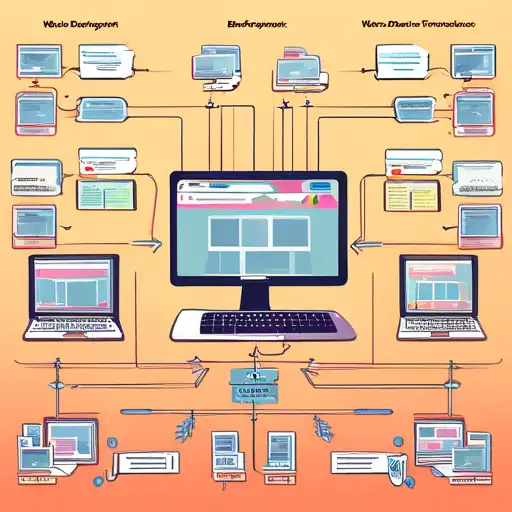Introduction to Web Development Frameworks
In the ever-evolving world of web development, choosing the right framework can be a daunting task. With a plethora of options available, each promising to be the best, it's crucial to understand your project's needs before making a decision. This guide aims to simplify the process, helping you navigate through the maze of web development frameworks to find the perfect match for your project.
Understanding Web Development Frameworks
Web development frameworks are designed to support the development of web applications by providing a standard way to build and deploy them. They offer a foundation upon which developers can build, saving time and effort by eliminating the need to start from scratch. Frameworks can be broadly categorized into frontend and backend, each serving distinct purposes in the web development process.
Frontend vs. Backend Frameworks
Frontend frameworks, such as React, Angular, and Vue.js, focus on the user interface and user experience aspects of a web application. They help in creating responsive, interactive, and dynamic web pages. On the other hand, backend frameworks like Node.js, Django, and Ruby on Rails deal with server-side logic, database interactions, and application architecture.
Factors to Consider When Choosing a Framework
Selecting the right framework involves considering several factors:
- Project Requirements: The nature and complexity of your project will significantly influence your choice of framework.
- Learning Curve: Some frameworks are more beginner-friendly than others. Consider your team's expertise.
- Community and Support: A strong community and good documentation can be invaluable resources.
- Performance: Evaluate the performance benchmarks of the frameworks you're considering.
- Scalability: Ensure the framework can handle your project's growth.
Popular Web Development Frameworks in 2023
Here's a look at some of the most popular web development frameworks this year:
- React: A JavaScript library for building user interfaces, known for its virtual DOM feature.
- Angular: A platform and framework for building single-page client applications using HTML and TypeScript.
- Vue.js: A progressive framework for building user interfaces, designed to be incrementally adoptable.
- Node.js: A JavaScript runtime built on Chrome's V8 JavaScript engine, ideal for building fast and scalable network applications.
- Django: A high-level Python web framework that encourages rapid development and clean, pragmatic design.
Conclusion
Choosing the right web development framework is a critical decision that can affect the success of your project. By understanding your project's needs and evaluating the available options based on the factors mentioned above, you can make an informed choice. Remember, the best framework is the one that aligns with your project's goals, team's skills, and future growth plans.
For more insights into web development, check out our guide on the latest web development trends.
